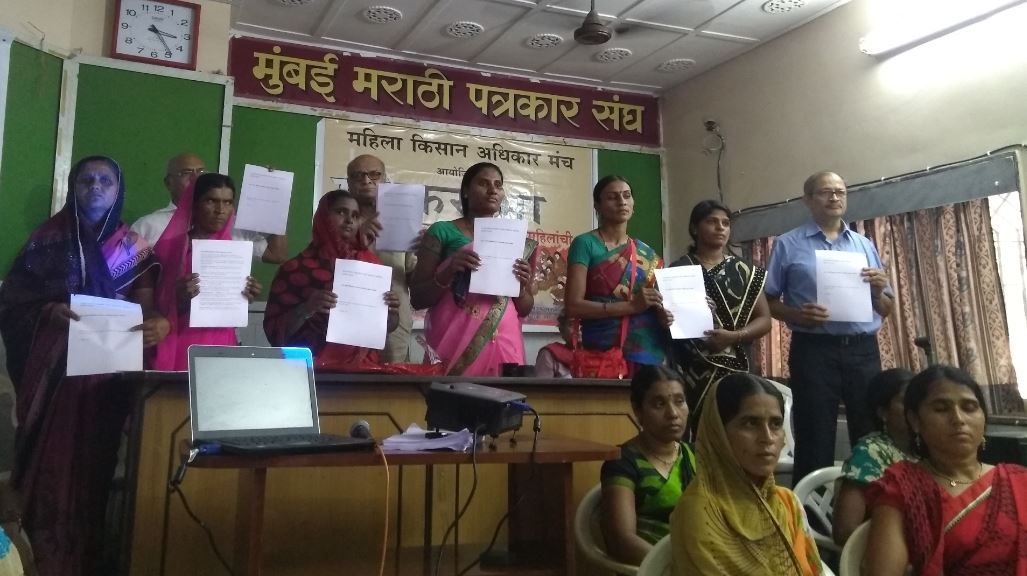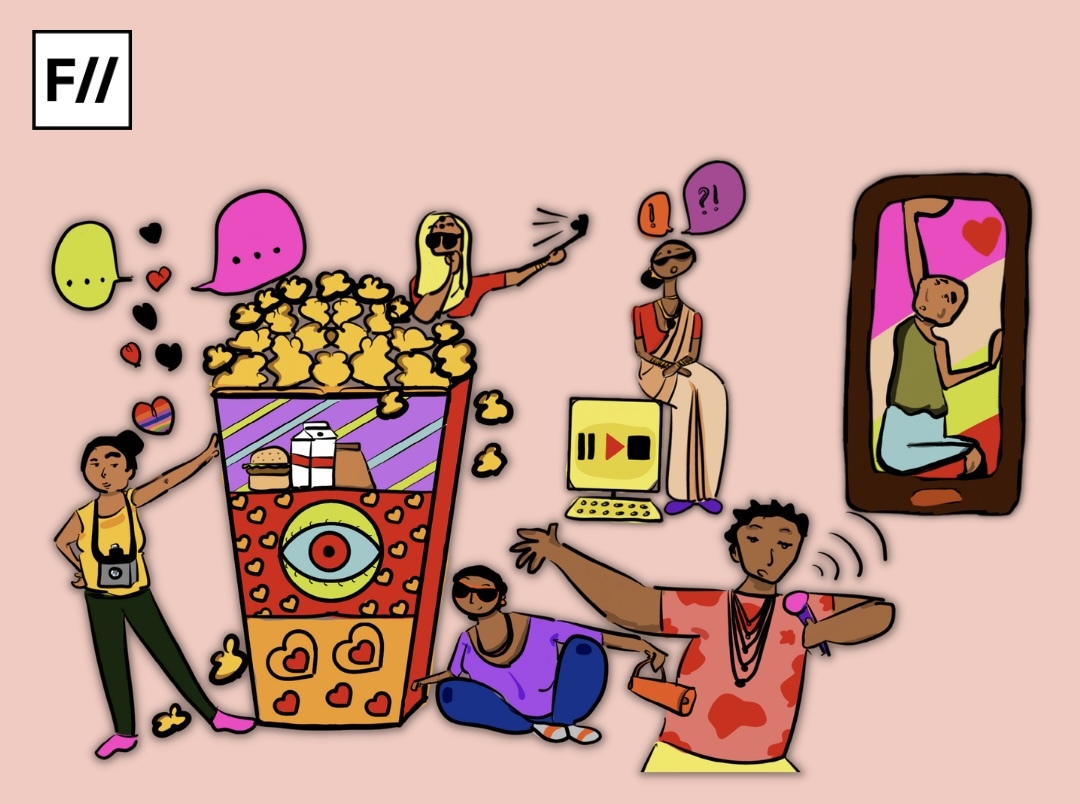We, as farmers, government officials, activists, civil society, media and people in general have looked at farmer suicides and what leads to it as a marker of agrarian crisis in Maharashtra. But what about those who are left behind to pick up the pieces after the suicide? What about the lives of the widowed farmers?
Archana Yadav, from Osmanabad district, Maharashtra, was only 21 when her husband decided to take his life. She was pregnant with her second daughter and her first daughter was just about 2. “Should I too continue living or die? I would question myself often”, she said. Today, although she has managed to pull herself out of mental trauma and shock, she still has a long fight left. Paying for the expenses for her parents-in-law and meeting education costs of her children are her grave challenges today.
Archana’s is one of the many stories of the widowed farmers of Maharashtra, whose husbands have committed suicide because of the growing indebtedness and farm losses. If we look at the National Crime Records Bureau (NCRB) data between 1995-2015, around 65,000 farmers have committed suicides, out of which 90% of the farmers are men, leaving a huge population of widowed farmers behind.
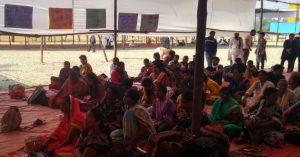
Women attending the condolence meeting and agitation at Azad Maidan, Mumbai.
On November 21, 50-75 widowed farmers from Marathwada and Vidarbha, travelling for the past 1-2 days from their homes, marched to Azad Maidan Mumbai, organising a condolence meeting and agitation, to present their demands. This was led by Mahila Kisan Adhikar Manch (MAKAAM) which is a nation-wide informal forum of 120 individuals and organisations from 24 states with the aim of advocating the issues of women farmers.
Around 20-25 organisations in Maharashtra are part of the forum, which since 2017, has been working closely with widowed farmers in the state. The meeting was led by women, who shared their experiences and demands. 6 MLAs too were presented and showed their support, with the opposition promising to raise the women’s issue in the assembly session. The meeting was followed by a press conference wherein a study report by MAKAAM on the situation of the women in the context of their access to social security schemes was released along with a booklet of case stories of women.
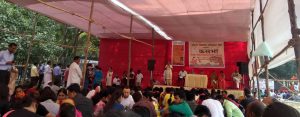
Women attending the condolence meeting and agitation at Azad Maidan, Mumbai.
The specific demands presented by women relate to increase in ex-gratia amount (immediate monetary relief), widow pensions, healthcare, education for children, urgent transfer of land titles and starting of a helpline, amongst others. “While suicide is most unfortunate and looking at it is critical, thinking of women too is vital. If we look at the government resolutions passed to do with suicide and farm losses, none talk about what could be done for the widowed farmers. We demand a comprehensive policy from the state, which will take into account all of their demands”, informed Seema Kulkarni, from MAKAAM.
MAKAAM with Maharashtra State Commission for Women (MSCW) had jointly organised two consultation meetings on ‘Ensuring security of women farmers from suicide affected households’ in February and March this year. The main objectives of the meeting was to understand the nature of the women’s questions, deliberating on how to resolve the same and deciding the further course of action. After the meeting emerged the study and the decision to organise the agitation to highlight their issues and demands. They also further plan to present their demands to the Chief Minister in the coming month.
What Does The Study Reflect?
Maharshtra ranks the highest in farmer suicides, with 3661 deaths in 2016, for both agricultural labourers and farmers, according to the provisional data presented to the Parliament by the Ministry of Agriculture and Farmers Welfare in March this year. The recent published data is of the year 2015, by the National Crime Records Bureau. According the 2015 NCRB report, ‘bankruptcy or indebtedness’ and ‘farming related issues’ were two of the major reasons for suicides that year.
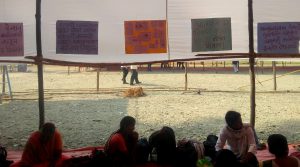
Posters put up by the women which speak of their demands as widowed farmers.
The study titled Present Status of Women Farmers from Suicide Affected Families, conducted by MAKAAM spanning 11 districts of Marathwada and Vidarbha, covering interviews with 505 widowed farmers. Conducted over a period of 2 months of September and October, it looked at the access of women to the social security schemes such as widow pension, land inheritance, ex-gratia payment and health schemes.
According to the study findings, only 34% of women have their pensions approved. Of these, 47 women had received pension for the 8 months preceding the study while 17 women had not received any pension amount. 48% women do not have independent ration cards, of which 34% have their names in their families’ card while 7% do not have any ration cards. For both the schemes, lack of awareness is the major issue. Of the women who are not being able to avail pension, 30% cited not being aware as a reason while 19% of women cited the same reason for absence of independent ration cards.
29% of the women have not inherited land in their names while 43% of the women have not inherited house in their name. The reasons cited by women for not being able to inherit land include – land not being allotted (29%), lack of information about it (24%), and opposition from in-laws (18%).
Only 8% of the children of the suicide affected families receive free education and only 27% of children received books and stationery free of cost. Many children have to discontinue schooling since they have to start providing for the family. Girls are the worst affected, as they are taken out from schools more as compared to boys, some even are married off soon.
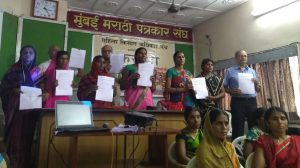
Unveiling of the study report by MAKAAM at the press conference.
For treatment of mental illness of the affected families, only 17% availed facilities from a government hospital. Likewise, for physical operation and treatment only 24% of the families sought help from a government hospital. Out of the same number of families, 68% had to take loans for treatment.
What Are The Demands Of The Widowed Farmers?
1. Ex-gratia payment – The criteria for the sum paid must be revised to include tenant farmers and account must be taken of successive years of crop failure to consider the suicide eligible. The amount given must be also raised at least 5 times. (Current amount is Rs. 1 lakh)
2. Widow Pension – Amount must be doubled (current amount Rs. 600) and the payment must be on time.
3. Education – Should be free for all the children along with bearing of other costs incurred.
4. Ration Card – Cards should be issued independently in the women’s name without demanding for application, and they must be included in the priority group for food security.
5. Healthcare – Free healthcare for all the families must be ensured, without the hassle of documents and paperwork.
6. Inheritance – Campaigns for awareness around land inheritance must be conducted in the districts and land registration in their names must be carried out on an urgent basis.
7. Assistance for employment and agriculture – Women must get the benefit of employment under MNREGA and benefit of irrigation and other schemes from the agriculture department.
8. Protection from sexual assault and violence – All the mechanisms in place at the district and taluka levels must be actively functioning and there must be campaigns undertaken to conduct hearings of such complaints.
9. Kisan Mitra Helpline – A helpline must be started immediately in suicide affected districts and an environment must be created where women can ask questions freely.
Other Issues At Large
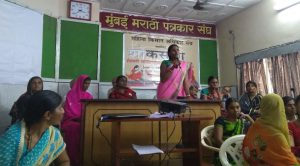
Nilima Bhalerao sharing her story. Other women like her also spoke at the press conference.
Nilima Bhalerao from Wardha, whose husband drank poison and died in 2015, had it extremely tough since then. Her in-laws had dispossessed her and she had to face abuse. She fought a difficult battle to get land in her own name. After a similar fight, she got her name in the house, but still she is not able to stay in it. She lives separately with 2 of her children. “I had gotten electricity connection from my neighbour’s line. My in-laws complained with the department about it being illegal and now, I live in darkness without electricity too”, she added.
Land rights for women and identity of women as farmers are the two of the main objectives for which MAKAAM strives.
Many women, like Nilima, have to fight for what are their rights, of inheritance of land and property, while facing abuse from their in-laws. Land rights are not only important for widows, but for women in general, simply because they are farmers too. Many women are even unaware of the familial land holdings, thus making it difficult for them to gain their right. Until the state takes measures to ensure the implementation of inheritance of land and fighting of social stigma attached to women claiming their rights, many women like Nilima will keep suffering.
Along with land rights, recognising women as farmers and recognizing their contribution to agriculture is important. Most of the widows are either farmers or farm labourers themselves, with even 89% of the women interviewed for the above mentioned study stating farming as their main source of occupation. The state must provide for infrastructure so that the women are able to sustain through farming. Of the five women who shared their stories in the press conference, 3 women explicitly demanded for irrigation facilities in their farm land. “The state must support the women and meet their demands so that they can spring back as agriculturists”, said Kulkarni.
Land rights for women and identity of women as farmers are the two of the main objectives for which MAKAAM strives. To conclude, I’d like to quote Vijay Jawandhiya, a prominent farmer leader from Vidarbha, who was present in solidarity with the women, “We are demanding our rights, not begging.”
Photography credits: Pragati Kulkarni
About the author(s)
Pragati has been part of PRADAN, an NGO working with women in the Adivasi areas of Madhya Pradesh for the past 3 years. Currently on a break from work, she dreams one day of being able to grow her own food, write exactly what she thinks and read all the books she has collected.
